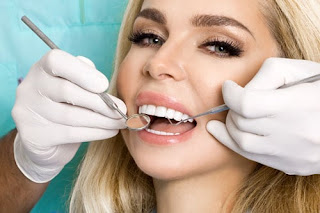Jaw pain, a common yet frequently misunderstood ailment, is often overlooked in its connection to oral health. However, a closer examination reveals that many underlying causes of this discomfort stem directly from dental issues. From tooth decay and gum disease to misaligned bites, the roots of jaw pain are deeply intertwined with the state of one's oral hygiene and dental practices.
This article unravels the complex relationship between oral health and jaw pain. The exploration offers insights into how maintaining and improving oral health can be pivotal in managing and potentially resolving jaw pain.
Understanding Jaw Pain
Jaw pain, or temporomandibular joint disorder (TMD), encompasses a range of conditions affecting the jaw joint and muscles. This pain can be due to various reasons, including arthritis, dislocation, injury, or problems with teeth alignment.
Symptoms often include a persistent ache around the ears, difficulty in opening the mouth, clicking or popping sounds when moving the jaw, and headaches. TMD can also lead to a condition called bruxism, where individuals unconsciously grind their teeth, especially during sleep. This grinding damages teeth and strains the jaw muscles and joints, exacerbating the pain.
Early diagnosis and treatment of these symptoms are crucial to prevent chronic pain and joint damage. Regular dental check-ups from Team Smiles Dentistry or other reputable clinics are pivotal in identifying and addressing these issues early on.
The Role Of Oral Hygiene
Good oral hygiene is a cornerstone of preventing jaw pain. Neglecting oral care can lead to problems like tooth decay, gum disease, and infections, which can contribute to or exacerbate jaw pain. Poor oral health often leads to additional stress on the temporomandibular joint, compounding the discomfort.
Regular brushing and flossing help remove food particles and plaque, preventing the build-up of bacteria that can cause oral infections. Using an appropriate toothbrush and technique is also crucial; harsh brushing can damage gums and teeth, leading to further complications.
Additionally, incorporating mouthwash and dental floss into one's daily routine is recommended. Regular dental check-ups are essential, as dentists can detect early signs of problems that could lead to jaw pain if left untreated.
Bruxism And Jaw Pain
Bruxism, the clinical term for teeth grinding and clenching, significantly contributes to jaw pain. This habit, often stress-induced, can occur during the day or night and goes unnoticed by many. The constant grinding puts pressure on the temporomandibular joint, leading to pain and discomfort.
Symptoms include jaw soreness, headaches, and even earaches. Long-term bruxism can wear down teeth and lead to sensitivity and decay. Treatment typically involves wearing a custom-fitted mouthguard at night to prevent grinding.
Managing stress through relaxation techniques, counseling, and exercise can also help reduce bruxism. Muscle relaxants or Botox injections are sometimes used to relax the jaw muscles, providing relief from the pain.
Misalignment And Bite Issues
Misalignment of teeth and bite issues are common causes of jaw pain. When teeth do not fit together correctly, it strains the jaw muscles, leading to pain and discomfort. Symptoms include difficulty biting or chewing, speech problems, and even changes in facial appearance.
Orthodontic treatment, such as braces or clear aligners, can correct these issues, thereby reducing stress on the jaw. These treatments improve the aesthetic appearance and enhance the overall function of the teeth and jaw.
Individuals need to seek regular dental evaluations, as early detection of misalignment can prevent more severe problems and associated pain in the future.
The Impact Of Gum Disease
Periodontal disease, also known as gum disease, is a gum infection that can affect the jaw's health. Initially, it presents as gingivitis, identified by red, swollen gums, and prone to bleeding.
Without proper treatment, this condition can advance to periodontitis. In this more severe stage, the gums begin to recede from the teeth, creating spaces or pockets that are susceptible to infection.
This advanced stage of gum disease can damage the bones and soft tissues supporting the teeth, leading to tooth loss. The infection and inflammation associated with gum disease can contribute to jaw pain and discomfort.
Good oral hygiene practices, regular dental check-ups, and professional cleanings prevent gum disease. In severe cases, periodontal therapy may be required to manage the condition.
Diet And Jaw Health
Diet plays a crucial role in maintaining oral and jaw health. Eating a balanced diet rich in vitamins and minerals is essential for strong teeth and bones, reducing the risk of conditions that can cause jaw pain.
Foods high in calcium and vitamin D, such as dairy products, leafy greens, and fish, are particularly beneficial. On the other hand, hard or chewy foods can exacerbate jaw pain by putting additional strain on the jaw muscles.
It's important to be mindful of food textures and to opt for softer options when experiencing jaw discomfort. Staying hydrated is also key, as a dry mouth can increase the risk of tooth decay and gum disease, potentially leading to jaw pain.
Stress Management And Relaxation Techniques
Stress is a common factor contributing to jaw pain, particularly through its role in promoting teeth grinding (bruxism). Effective stress management is, therefore, vital in alleviating jaw pain. Techniques such as deep breathing exercises, mindfulness meditation, and yoga can help reduce overall stress levels.
Engaging in regular physical activity and ensuring adequate sleep are also important in managing stress. Hobbies and activities that promote relaxation—such as reading, painting, or listening to music—can be beneficial.
Additionally, cognitive-behavioral therapy (CBT) can effectively change stress-related habits and reduce the incidence of teeth grinding. Sometimes, consulting with a mental health professional can provide tailored strategies to manage stress more effectively.
Conclusion
Jaw pain is a multifaceted issue with strong ties to oral health. From bruxism's impact to gum disease's effects, it's clear that maintaining good oral hygiene is key to preventing and treating jaw pain. Addressing factors like teeth alignment, diet, and stress is also critical.
By understanding these connections and taking proactive steps toward oral care, individuals can significantly improve their quality of life, freeing themselves from the discomfort of jaw pain.



